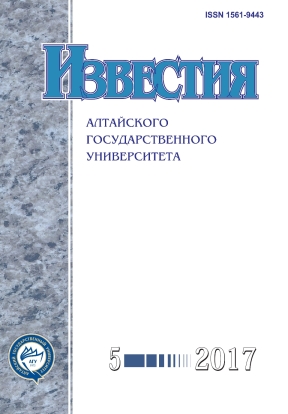Walter Ulbricht and the Renewal of the GDR in 1960s
Abstract
The period of the 1960s is the time of renewal in economy, law, society, culture, sports and other life spheres of the German Democratic Republic after the construction of the Berlin Wall. This article discusses the role of the GDR leader W. Ulbricht in the development of the concept and the transformation with the account of the internal and external influences on the dynamics and the result of the reformation. The three pillars of the renewal concept were the building of a new economic system (stronger ties between science, technology and economic activity), the change in the practices of party organs (abandoning of on-the-spot intervention in favor of strategic planning), and the strengthening of the central role of government and law. Ulbricht’s increased focus on the GDR development strategy was in tune with his notion of the role of “Landesvater”. Inspired by the possibilities of the scientific-technological revolution, the GDR leader decided to rely on technocrats and dismiss Stalinist party functionaries. However, he still acknowledged the SED as the key player in the political system. The continuing supremacy of the SED made it possible for the conventionalists in the Central Committee to stop the renewal and force its initiator to resign in May 1971. The dismissal of Ulbricht was largely orchestrated by the Soviets that in the aftermath of the Prague Spring viewed any innovation in the building of the Socialism in Eastern Europe as a threat to the security of the USSR.
DOI 10.14258/izvasu(2017)5-22
Downloads
Metrics
References
Port A.I. Conflict and Stability in the German Democratic Republic. — Cambridge, 2009.
Epstein C. The Last Revolutionaries: German Communists and Their Century. — Cambridge, 2003.
Frank M. Walter Ulbricht: Eine deutsche Biografie. — Berlin, 2001.
Kaiser M. Machtwechsel von Ulbricht zu Honecker: Funktionsmechanismen der SED-Diktatur in Konfliktsituatio-nen 1962 bis 1972. — Berlin, 1997.
Grieder P. The East German Leadership, 1946-73: Conflict and Crisis. — Manchester, 1999.
Stokes R.G. Constructing Socialism: Technology and Change in East Germany 1945-1990. — Baltimore, 2000.
Graf H. Zwanzig Jahre an Ulbrichts Seite // Walter Ulbricht: Zeitzeugen erinnern sich / hrsg. E. Krenz. — Berlin, 2013.
Evans A. The Last Gasp of Socialism: Economics and Culture in 1960s East Germany // German Life and Letters. — 2010. — Vol. 63. — №3. D0I:10.1111/j.1468-0483.2010.01502.x.
Roesler J. Demokratische und technokratische Wirt-schaftsreformer in der DDR: Die politischen Schick-sale von Fritz Behrens und Wolfgang Berger // Welt-Trends. — 1998. — №18.
Caldwell P.C. Dictatorship, State Planning, and Social Theory in the German Democratic Republic. — Cambridge, 2003.
Steiner A. Von Plan zu Plan: Eine Wirtschaftsgeschich-te der DDR. — Munchen, 2004.
Neues Deutschland. — 1964. — 7. Oktober.
Schroeder K. Der SED-Staat: Partei, Staat und Gesell-schaft 1949-1990. — Munchen, 1998.
Augustine D.L. Innovation and Ideology: Werner Hartmann and the Failure of the East German Electronics Industry // The East German Economy, 1945-2010: Falling Behind or Catching Up? / ed. H. Berghoff, U. A. Balbier. — Cambridge, 2013.
Augustine D.L. Red Prometheus: Engineering and Dictatorship in East Germany, 1945-1990. — Cambridge, 2007.
Eghigian G. Homo Munitus: the East German Observed // Socialist Modern: East German Everyday Culture and Politics / ed. K. Pence, P. Betts. — Ann Arbor, 2008.
Jessen R. Akademische Elite und kommunistische Dik-tatur: Die ostdeutsche Hochschullehrerschaft in der Ulbricht-Ara. — Gottingen, 1999.
Brockmann S. The Eleventh Plenum and Film Criticism in East Germany // German Life and Letters. — 2013. — Vol. 66. — №4. D0I:10.1111/glal.12026.
Roesler J. Zwischen Plan und Markt: Die Wirtschafts-reform in der DDR zwischen 1963 und 1970. — Berlin, 1990.
Хаберл-Яковлева Г. Национальные экономические интересы СССР и ГДР в научно-техническом сотрудничестве в 1965-1975 гг. // Пространство и Время. — 2015. — №1-2 (19-20).
Roesler J. Das NOS in der DDR — gescheiterter Aus-bruch aus dem Staatssozialismus // Reformen und Reformer im Kommunismus / hrsg. W. Hedeler, M. KeBler. — Hamburg, 2015.
Fulbrook M. The Concept of ‘Normalisation’ and the GDR in Comparative Perspective // Power and Society in the GDR, 1961-1979: ‘Normalisation of Rule’? / ed. M. Fulbrook. — N.Y.; Oxford, 2009.
Madarasz J. Conflict and Compromise in East Germany, 1971-1989: a Precarious Stability. — L., 2003.
Copyright (c) 2017 А.М. Бетмакаев

This work is licensed under a Creative Commons Attribution 4.0 International License.
Izvestiya of Altai State University is a golden publisher, as we allow self-archiving, but most importantly we are fully transparent about your rights.
Authors may present and discuss their findings ahead of publication: at biological or scientific conferences, on preprint servers, in public databases, and in blogs, wikis, tweets, and other informal communication channels.
Izvestiya of Altai State University allows authors to deposit manuscripts (currently under review or those for intended submission to Izvestiya of Altai State University) in non-commercial, pre-print servers such as ArXiv.
Authors who publish with this journal agree to the following terms:
- Authors retain copyright and grant the journal right of first publication with the work simultaneously licensed under a Creative Commons Attribution License (CC BY 4.0) that allows others to share the work with an acknowledgement of the work's authorship and initial publication in this journal.
- Authors are able to enter into separate, additional contractual arrangements for the non-exclusive distribution of the journal's published version of the work (e.g., post it to an institutional repository or publish it in a book), with an acknowledgement of its initial publication in this journal.
- Authors are permitted and encouraged to post their work online (e.g., in institutional repositories or on their website) prior to and during the submission process, as it can lead to productive exchanges, as well as earlier and greater citation of published work (See The Effect of Open Access).








